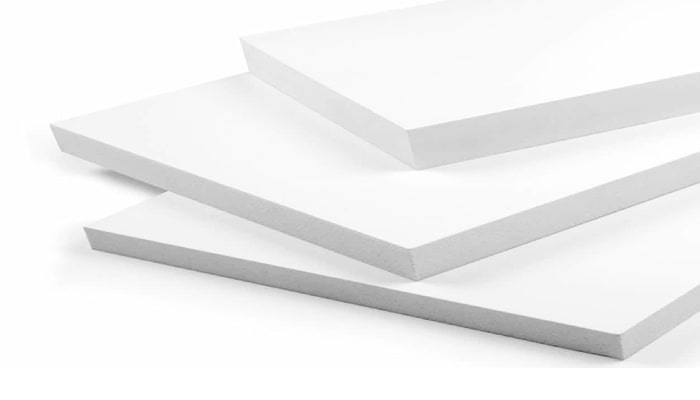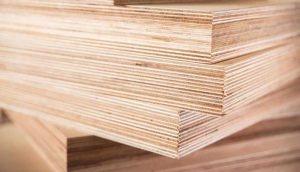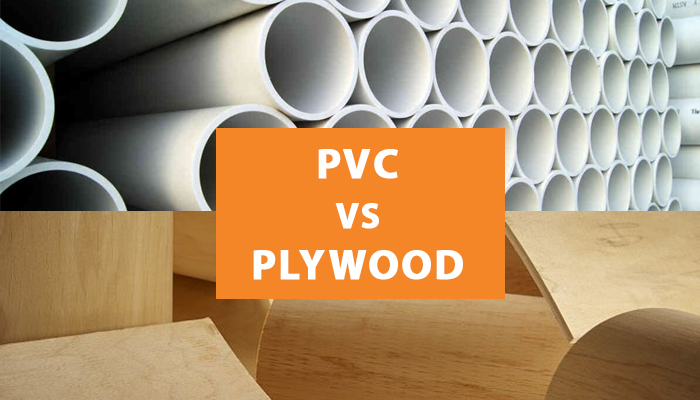With diverse requirements in terms of materials as well as designs and features of consumers, more and more types of wood are born to meet the needs, and so are PVC Board and Plywood. Let’s learn about these two kinds of wood with A1 Plywood through the article below!
1. Concept
1.1. What is PVC Board?
Fully made from plastic, PVC is the go-to-material for many industries. They are light-weight and moisture resistant. It is also corrosion-free. It means, rain or sun, PVC materials stand the test of time.

PVC is also quite flexible in terms of its usage as per requirements. You can paint it, engrave or emboss or even laminate. Also, PVC foam boards are durable.
One such material is Poly Vinyl Chloride, widely known as PVC. It is highly preferred these days due to it is lightweight, strength, durability and most of all, water-resistant characteristics. It is thus, a preferred material in making wall panels, display panels, vehicle ceilings, screen printing, advertising and so on.
1.2. What is Plywood?
Recently, Plywood is the most popular and versatile wood-based panel. It’s a laminated product made up of numerous thin strips of wood laid in alternating directions and bonded with a different kind of glue. But due to its construction method, plywood is less susceptible to expansion or shrinkage. Why?

A board of made from solid wood is unstable and tend to expand or shrink across the grain based upon the moisture content in the wood. The function of the core layers is to increase the separation between the outer layers where the bending stresses are highest, improving resistance to bending forces.
2. Similarities of PVC Board and Plywood
Durability: These two types of wood are both very durable, PVC boards are highly strong which ensures that they don’t undergo any deformation. The boards can survive for as long as 4 decades without any damage. Plywood is made up of numerous thin strips of wood laid in alternating directions and bonded with a different kind of glue.
Environment-friendly: PVC is made of recycled waste plastic and wood. Plywood is made by many veneers and bonded with a different kind of glue.
3. Differences between PVC Board and Plywood
3.1. Moisture Resistance
Plywood may not efficiently sustain the moisture and heat while PVC will be a perfect choice for longevity and durability of the materials to sustain moisture and heat.
3.2. Flexibility
PVC is very flexible compared to plywood. You can cut or shape PVC Foam Boards according to your requirement, But it plywood, it’s not possible.
Flexible to use PVC plastic Sheets for various purposes without any limitations but this may not be possible in plywood.
3.3. Appearance
PVC foam boards have lesser colour options compared to composite boards. But they have an appeal of their own. Plywood has various colors.
3.4. Application
PVC Board is used for the ceilings of Cars, Buses or Trains, office furniture, build external wall panels, home interiors can be designed using PVC foam boards, sign boards and outdoor advertising kiosks, Used in Construction, Garage Doors, POP Displays, Exhibit Spaces & Signage
3.5. Fire Resistant
PVC panels are self-extinguishing and cannot catch flame. It has a UL-94 flame rating, which is the highest rating in terms of fire resistance. In contrast, Plywood is not.
3.6. Waterproof
PVC board is moisture and corrosion resistant. It is absolutely lightweight. It is also resistant to chemicals. The overall thickness of the material will range from 6 mm to 45mm. It is feasible to engrave, emboss, paint, print, laminate and mill the surface of the foam board according to your requirements.
3.7. Weight
In terms of weight and cost, PVC is much lighter in weight due to the combination of plastic and wood, plywood will be heavier.
4. Which of these two should you choose?
For designing: if you want to barrier out of study room, the PVC board is best choice. The PVC has eye-catching, attractive colors.
Self-extinguishing: As the PVC materials widely is used in kitchen, flame resistantance is also an important aspect. If the kitchen cabinet caught fire, it will be not flammable, and the material will self-extinguishing.
Installation: PVC boards need professional installation but composite boards can be easily installed or modified.
Features: When it comes to water and moisture resistance, both types come with excellent resistance. As for slip resistance, composite boards may offer better resistance, but you can check with a PVC foam board manufacturer, on the slip quotient of the PVC.
Easily shaped and painted: PVC can be given any shape to suit your requirements. It can be cut for the furniture of your house or can be made into wall panels for exterior use. Also, it can be painted with any type of paint which lasts for years and gives the look and feel as if it is new!
Pocket-friendly: They are a good substitute for wood or aluminium and they come in a variety of price range. They don’t require any extra maintenance and stay in the same state for quite a long time. No special equipment is required to cut or drill them and this makes them pocket-friendly to use.
Weight and Flexibility: With light weight between wood and plastic combination, PVC has high flexibility, easy to move.
5. A1 Plywood – Prestigious and quality Plywood factory
A1 Plywood is committed to the prestige and quality of products, ensuring that Plywood panels are always delivered to customers according to requirements and designs.
We own a direct furniture factory in Vietnam, with a team of skilled carpenters; each product is made carefully from the stage of choosing boards to construction and installation.
The factory accepts orders to produce Plywood boards based on the correct sizes and measurements as required, and delivery on time.
The above is the differences between PVC Board and Plywood, basing on it customer can choose the suitable wood.
Related keywords: pvc foam board vs plywood, pvc board vs plywood, what is pvc board used for, what is pvc board, is pvc board strong, is pvc board heat resistant, pvc foam material, is pvc board waterproof, what is a pvc board, what is pvc foam, polyvinyl chloride foam
